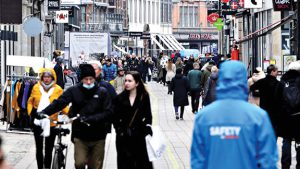Bloomberg
Denmark’s unemployment rate plunged to the lowest level in 14 years, adding to concerns of overheating in the Nordic country that’s emerging from the coronavirus pandemic as one of economic winners.
The gross rate declined to 2.5% in December from 2.8% a month before, falling for the first time to the level it was before the 2008 financial crisis. The data, released on Monday by Statistics Denmark, prompted economists to warn that labour shortages are mounting.
“The momentum in the labour market is incredibly strong, but we also have to note that the unemployment rate is now dangerously low,†Soren Kristensen, the chief economist at Sydbank, said in an note. “Which such a low rate, the prospect of overheating is
moving closer.â€
While Denmark’s economy returned to pre-pandemic levels already last spring, an increasing number of Danish businesses have reported that labour shortages are limiting production. Earlier this month, the government secured majority backing for measures to tackle the shortages, including cutting jobless benefits for fresh graduates and boosting incentives for seniors to remain in the workforce.
The statistics agency said that the December rate may be lower than normal due to changes in vacation laws, which may have prompted more workers to take time off.
Denmark will end virus restrictions and reclassify Covid-19 as a disease that no longer poses a threat to society, even as infections hit a record high.
Denmark’s decision on reclassifying the virus dramatically pushes forward an idea that’s emerged recently in Europe — that it’s time to start thinking about Covid as endemic rather than a pandemic. However, World Health Organisation experts have warned against complacency.
The easing of curbs also echoes recent moves elsewhere — including Ireland and the UK — to scale back restrictions amid signs that Omicron is less dangerous than earlier variants of the virus. Denmark is ahead of its Nordic neighbours. Swedish authorities are extending their restrictions due to a surge in infections but expect to be able to remove most curbs in two weeks.
Denmark’s current restrictions include limited opening hours for restaurants and use of Covid passports and requirement of face masks in stores and at some indoor events.
 The Gulf Time Newspaper One of the finest business newspapers in the UAE brought to you by our professional writers and editors.
The Gulf Time Newspaper One of the finest business newspapers in the UAE brought to you by our professional writers and editors.
